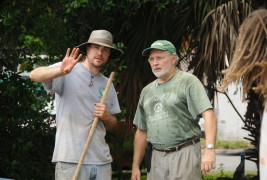by Dell deChant
Tampa recorded a record-high temperature for Christmas Day this year — 86 degrees, a little “Christmas Heat.” The old record was 83, reached in 1984, 1942 and 1911. Tampa’s high was also the highest ever recorded for any day in December in this part of Florida.
Here at our little organic farm in New Port Richey, we also had a very high temperature on Christmas Day — 87 degrees. Our winter crops are wilting in the climate-change heat, which feels more like early summer than early winter.

While many Floridians (and Americans) deny anthropogenic (human-caused) climate change, 97 percent of all climate scientists do not. Regardless of the denials, this past December will likely be the hottest on record and this fall the hottest in recorded history. I wish our winter crops (kale, swiss chard, and broccoli) could deny the record-breaking heat with as much self-assurance as skeptics deny anthropogenic climate change.
We are not alone. Abnormal weather has been impacting the entire country, especially the East, where record-high temperatures were recorded on Christmas Day at numerous locations. Some cities reported temperatures 25 degrees above normal. There has been little snow, but record-breaking tornadoes (in number and duration). Tornadoes, by the way, are common in the spring — not the winter. In this part of Florida, we are running only 10 to 15 degrees above normal — balmy!
This coming year probably will be different. But the fact that we were so very, very hot in December, and setting records every week, offers rather compelling evidence that climate change is impacting Florida in a major way, despite denials that it is happening. In point of fact, it probably will not be as hot next year as it has been this fall and early winter. And remember, 2010 saw record-cold temperatures in December.
Occasional cold, however, does not contradict climate-change forecasts or the future warming of the planet, our state and region. If the science is right, in the very near future, another fall will be hotter than this one, and we will have hotter falls than that in years to come. This is what climate science tells us. We deny it at our peril. And if the science is right, in years to come, this hot fall will appear cool by comparison.
Convincing skeptics may be worth the effort for some. A better investment of energy, however, might be supporting those who recognize the reality of anthropogenic climate change and are doing something about it — working for meaningful changes to our culture and our collective consciousness before climate challenges become insurmountable.
Local groups and projects with such a commitment are especially worthy of support in the coming year. These include Pasco Ecofest, Tasty Tuesdays, the Green Commerce Association, the Grand Gardens, the New Port Richey Library’s Seed Library, Friendship Farms & Fare, the Pasco County Food Policy Council and the Florida Loquat Festival.
Individually and collectively, these groups and projects are meeting the challenge of climate change not by rebutting deniers and debating skeptics, but by teaching ecological stewardship, pioneering urban agricultural projects and building resilient community structures. In themselves, these activities will not bring down the temperature. But they do offer cool alternatives to complaining about anthropogenic climate change or its deniers.
Dell deChant is associate chairman of the department of religious studies at the University of South Florida, chairman of the environmental committee of the city of New Port Richey, a founding member of the Food Policy Council of Pasco Country, a member of the board of directors of Ecology Florida and a member of the steering committee for Friendship Farms & Fare.


Leave a Reply